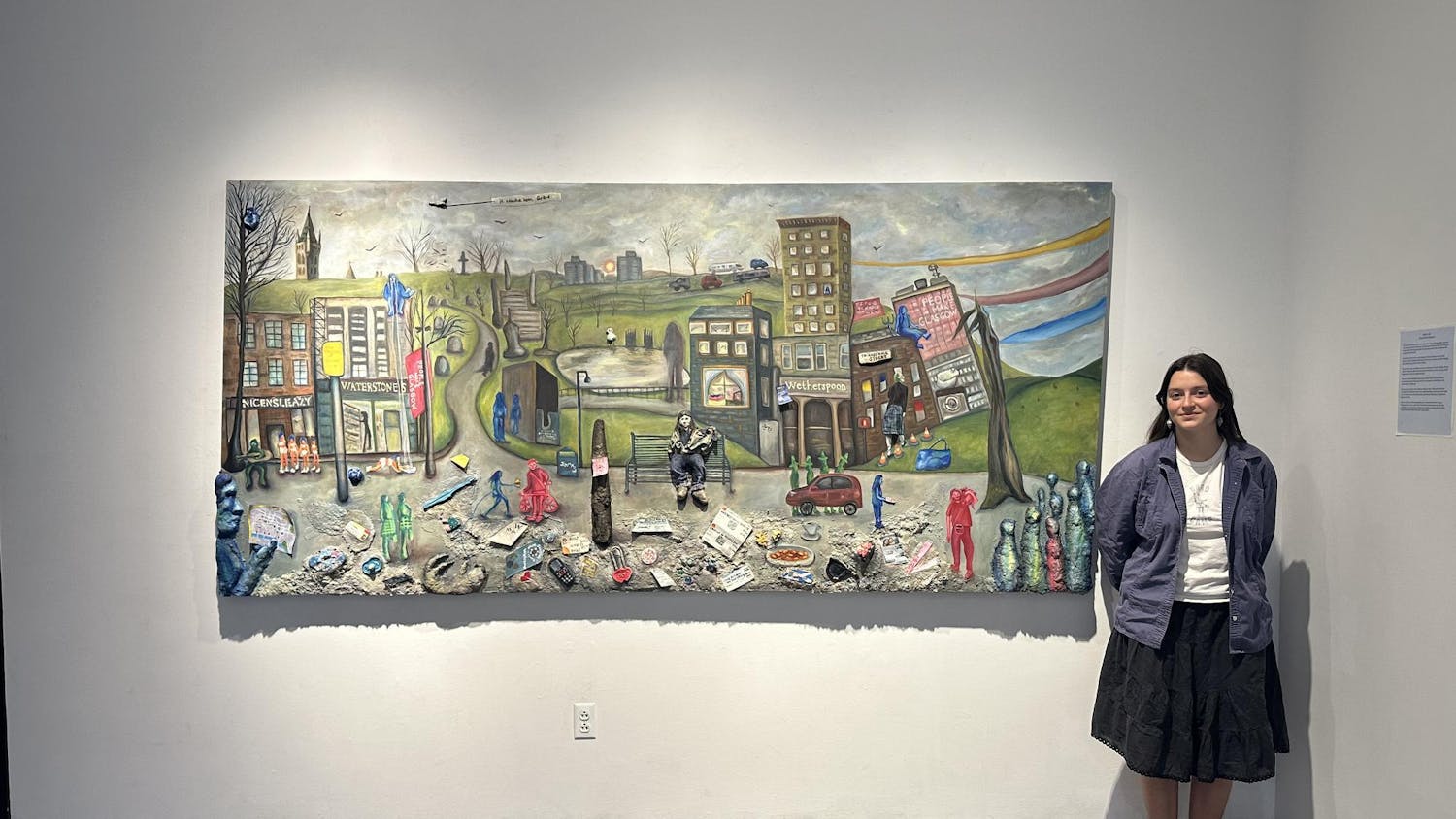Lost in a storm, a young professor stumbles into a trap. Mr. Shawqi, a man who loves nothing more than winning a game, holds the professor prisoner and changes the rules of his games so his opponent can never win or escape. Mr. Shawqi insists he is not crazy — this is the way of the universe. “Look at the world: It is divided into masters and slaves,” he says.
As the play continues, these cynical words appear to possess a dark truth.
The audience learns the professor played the role of master to his wife, just as Mr. Shawqi is now his master. In this nightmarish world, the motif of domination continually reappears.
International Writers Project fellow Nihad Sirees said his play “House of Games,” performed in a staged reading as part of this week’s Urgent Witness festival, is a metaphor for political oppression in Syria. But when it was first published in Syria in 1997, Sirees said he claimed it was an indictment against western imperialism in order to prevent government censorship.
Erik Ehn, director of the International Writers Project, said the play is a perfect example of “oppositional art underneath a dictatorship.”
The Urgent Witness festival aimed to explore complex themes, among them the role of art in creating social change in the Middle East, globalization and localization, the meaning of tyranny and the recognition of humanity in others. The events, which took place on Tuesday and Wednesday, featured Adonis, the world-renowned Syrian poet, Sirees and other creative thinkers from the Arabic world.
“I knew I wanted to push conversation about Syria deeper into the University because every day the situation just grows more florid,” said Ehn, who organized the event with Peter Gale Nelson and Lori Baker of IWP.
The festival, co-sponsored by the Department of Literary Arts, Middle East Studies, Theater Arts and Performance Studies, the Watson Institute for International Studies and the Office for International Affairs, included a poetry reading and a panel discussion on translation. The Cogut Center for the Humanities organized a related panel on the role of hip-hop in the Arab Spring.
“(When) we think about Middle Eastern politics … we think not usually of young people enough as agents of change,” said Tricia Rose, professor of Africana Studies and interim director of the Cogut Center. “We see them as sort of wanting peace, but not as agents of change, and so this gives us a way to do that — to at least start.”
The local and the global
The Cogut Center event, “Poetic Forces: Creative Change in and Beyond the Arab Spring,” began with a screening of “Masrah Deeb,” a music video released during the first week of the Egyptian revolution. A screen in The Martinos Auditorium of the Perry and Marty Granoff Center for the Creative Arts flashed with images of railway tracks, narrow alleyways and Cairo faces.
“I’m not a dictator/ Deeb’s a doctor / in the beat department,” rapped Deeb, who was a protester in the Egyptian Arab Spring.
Deeb and other panelists began by discussing a seeming paradox: While hip hop’s rise in Egypt demonstrates the globalization of African-American culture, Deeb’s rap lyrics are also “intensely local,” said Elias Muhanna, professor of Middle East studies.
Nancy Khalek, professor of religious studies, said in both the United States and the Middle East, hip hop artists use rap to talk about the struggle to rise from a “dire situation.” These artists imbue their form with culturally relevant elements, she added.
While discussing translation on the panel “Poetics Without Borders: Communicating Sensibility in Times of Change,” Sirees and Adonis also explored their relationship to the local and global.
Sirees said Arabic fiction is becoming increasingly localized, employing colloquial dialogue and giving voice to people of different backgrounds and class levels. The trend, he said, is creating new challenges for translators, who must attempt to capture the texture of locality and make it universally accessible.
Adonis, who is lauded for translating authors such as T.S. Eliot and Saint John-Perse into Arabic, began with a simple statement — “I’m not involved in translation,” he said in Arabic. Miled Faiza and Karen McNeil translated his words to English.
“Translation is the destruction of poetry. Every translator of poetry must be a traitor,” he said.
Adonis stressed that he is a poet and that translation is an art itself. The translator must create new meaning in the context of his own language. Translating poetry is still crucial for communication between groups of people, he added later.
“We have to take care of the translation in spite of the difficulties,” he said.
Beyond the translation
Translation aside, watching Adonis read his poetry enthralled Arabic and non-Arabic speakers alike. Sophie Hawley-Weld ’14, who speaks no Arabic, said she was “totally engrossed in the way that he was saying it.”
Adonis, 83-years-old, is a man of small stature. While reading before an audience of about 80 in Macmillan Hall, the poet gripped his fists and extended his palms. His voice rose and fell. His lips pursed into frowns and widened into smiles. Several times, he closed his eyes and recited from memory.
He took turns reading with Cole Swensen, chair of the literary arts department, who read selections from “Adonis: Selected Poems,” translated by Khaled Mattawa: “Wings / but made of wax / and the falling rain is not rain / but ships that sail our weeping.”
Called the “greatest living poet of the Arab world” and “comparable to T.S. Eliot in the Anglophone world” by the Guardian, Adonis is credited for his role in the birth of modernist Arabic poetry. His poems explore a variety of subjects including erotic love, natural elements and the destruction rendered by war.
Adonis believes poetry that leaves space for reader interpretation and encourages creative methods of perception is necessary for the type of revolutionary change needed in Arabic culture, according to the introduction to Mattawa’s translation.
During a question-and-answer session following the reading, a student said Arab poets have served as an inspiration for political revolution but have failed to be a source of continued support.
The remark echoed comments made by others outside the University, who have attacked Adonis for criticizing the Syrian opposition, the Guardian reported.
“We’ve gone immediately into politics,” Adonis said in Arabic. His words were translated by Robert Creswell, professor of comparative literature.
“You can’t ask for poets to play the role of rifles. Poets are one thing. Rifles are another,” he said. He emphasized that he too wanted change.
“I’m one of those who dreams that we will get out of this infernal machine,” he said, adding that by “infernal machine” he meant the Arab world’s long history of conflict and war.
He said he wanted a revolution that would not only overturn a political regime, but would also change society, creating freedom for women and space for other interpretations of Islam.
ADVERTISEMENT




